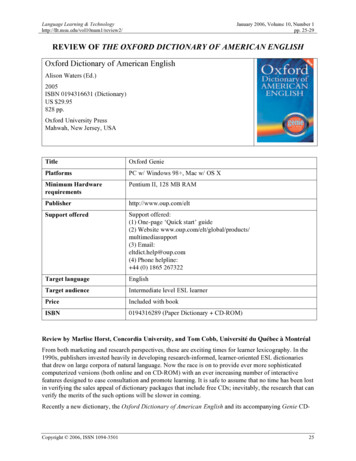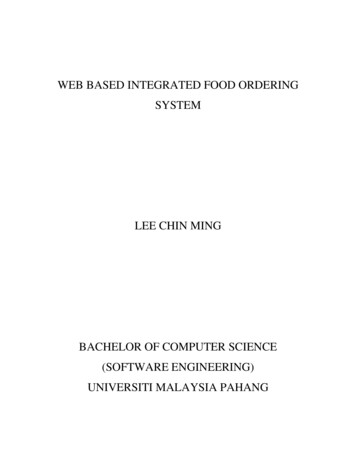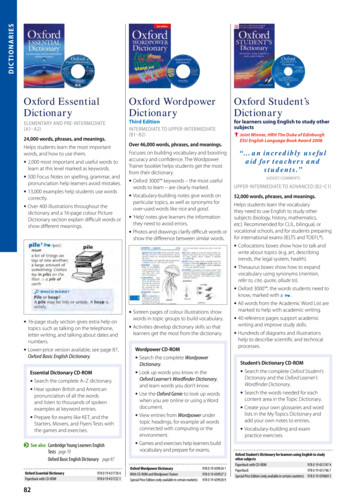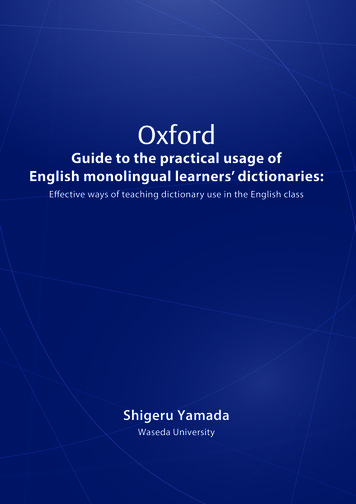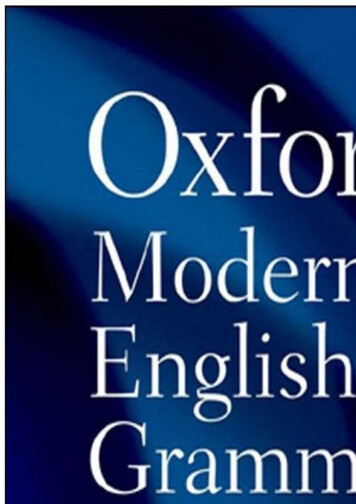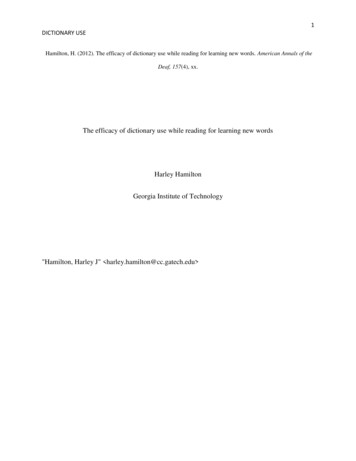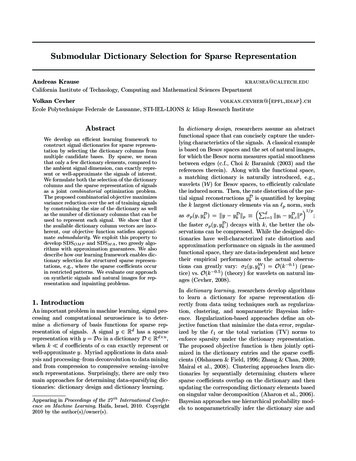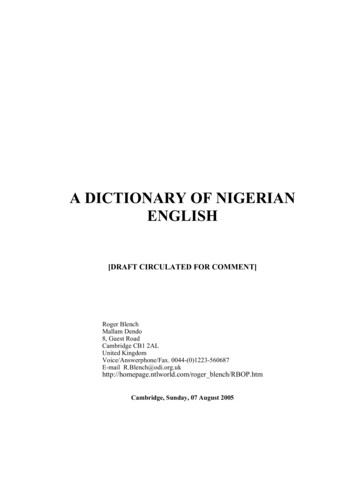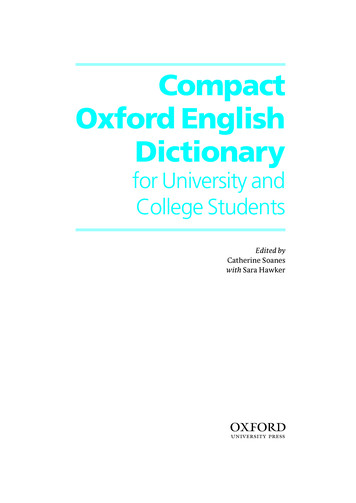
Transcription
Compact-Stu prelims P7.117/5/0611:51 amPage iCompactOxford EnglishDictionaryfor University andCollege StudentsEdited byCatherine Soaneswith Sara Hawker1
chloroform chopchloroform noun a sweet-smelling liquid usedcas a solvent and formerly as a generalanaesthetic.– origin from chlorine formic acid.chlorophyll /klo-ruh-fil/ noun a green pigmentwhich enables plants to absorb light so as toprovide energy for photosynthesis.– origin from Greek khlōros ‘green’ phullon‘leaf’.chloroplast /klo-ruh-plahst/ noun a structurein green plant cells which contains chlorophylland in which photosynthesis takes place.– origin from Greek khlōros ‘green’ plastos‘formed’.chocaholic noun variant spelling ofchocoholic.choccy noun (pl. choccies) informal chocolate, or achocolate sweet.choc ice noun Brit. a small bar of ice cream witha thin coating of chocolate.chock noun a wedge or block placed against awheel to prevent it from moving.– origin Old French çoche.chock-a-block adjective informal, chiefly Brit.completely full of people or things pressedclose together.– origin first in nautical use, with reference totackle having two blocks (pulleys) runningclose together.chock-full adjective informal filled tooverflowing.– origin unknown.chocoholic (also chocaholic) noun informal aperson who is very fond of chocolate.chocolate noun 1 a food made from roastedand ground cacao seeds, eaten as a sweet ormixed with milk and water to make a drink.2 a sweet made of or covered with chocolate.3 a deep brown colour.– derivatives chocolatey (also chocolaty)adjective.– origin Nahuatl.chocolate-box adjective Brit. (of a view orpicture) pretty in a conventional or idealizedway.chocolatier /chok-uh-lat-i-er/ noun (pl.pronounced same) a person who makes orsells chocolate.– origin French.choice noun 1 an act of choosing. 2 the right orability to choose. 3 a range from which tochoose: a menu offering a wide choice of dishes.4 a person or thing that has or can be chosen:this disk drive is the perfect choice for yourcomputer. adjective 1 of very good quality.2 (of language) rude and abusive.– phrases of choice chosen as one’s favouriteor the best: champagne was his drink of choice.– origin Old French chois.choir noun 1 an organized group of singers,especially one that takes part in churchservices. 2 the part of a large church betweenthe altar and the nave, used by the choir andclergy.– origin Old French quer, from Latin chorus.choirboy (or choirgirl) noun a boy (or girl) whosings in a church or cathedral choir.choke verb 1 prevent someone from breathingby squeezing or blocking their throat ordepriving them of air. 2 have trouble168breathing. 3 fill a space so as to makemovement difficult or impossible: the roadswere choked with traffic. 4 (choke somethingback) suppress a strong emotion: she chokedback tears of rage. 5 (choke up or be chokedup) feel tearful or very upset. noun a valve inthe carburettor of a petrol engine used toreduce the amount of air in the fuel mixture.– origin Old English.choker noun a necklace or band of fabric whichfits closely round the neck.chokey noun Brit. informal, dated prison.– origin Hindi, ‘customs house, police station’.choky adjective 1 having or causing difficulty inbreathing. 2 having difficulty speaking as aresult of strong emotion.cholecalciferol /ko-li-kal-sif-uh-rol/ noun aform of vitamin D (vitamin D3), producednaturally in the skin by the action of sunlight.– origin from Greek kholē ‘gall, bile’ calciferol.choler /kol-uh/ noun 1 (in medieval science andmedicine) one of the four bodily humours,believed to be associated with an irritabletemperament. 2 old use anger or bad temper.– origin from Greek kholē ‘bile’.cholera /kol-uh-ruh/ noun an infectiousdisease of the small intestine which causessevere vomiting and diarrhoea.– origin Latin, ‘diarrhoea, bile’.choleric /kol-uh-rik/ adjective bad-tempered orirritable.cholesterol /kuh-less-tuh-rol/ noun acompound which occurs normally in mostbody tissues and is believed to lead to diseaseof the arteries if present in highconcentrations in the blood (e.g. as a result ofa diet high in animal fat).– origin from Greek kholē ‘bile’ stereos ‘stiff’.chomp verb munch or chew food noisily orvigorously.– origin imitating the sound.chook /chuuk/ noun informal, chiefly Austral./NZ a henor chicken.– origin probably from English dialect chuck‘chicken’.choose verb (past chose; past part. chosen) 1 picksomeone or something out as being the best oftwo or more alternatives. 2 decide on a courseof action: the men chose to ignore his orders.– origin Old English.choosy adjective (choosier, choosiest) informalvery careful when making a choice and so hardto please.– derivatives choosiness noun.chop1 verb (chops, chopping, chopped) 1 cutsomething into pieces with repeated sharp,heavy blows of an axe or knife. 2 strikesomething with a short, heavy blow. 3 get ridof something or reduce it by a large amount:the share price was chopped from 50p to 21p. noun 1 a thick slice of meat, especially pork orlamb, next to and usually including a rib. 2 adownward cutting blow or movement. 3 (thechop) Brit. informal dismissal from employment,or the cancellation of a plan or project.– origin variant of chap1.chop2 verb (chops, chopping, chopped) (inphrase chop and change) Brit. informal repeatedlychange one’s opinions or behaviour.
169– origin perhaps related to cheap.chop-chop adverb & exclamation quickly.– origin pidgin English.chopper noun 1 a short axe with a large blade.2 informal a helicopter. 3 (choppers) informalteeth. 4 informal a type of motorcycle with highhandlebars.choppy (choppier, choppiest) adjective (of thesea) having many small waves.– derivatives choppiness noun.chops plural noun informal a person’s or animal’smouth, jaws, or cheeks.– origin unknown.chopstick noun each of a pair of thin, taperedsticks held in one hand and used as eatingutensils by the Chinese and Japanese.– origin pidgin English, from a Chinese dialectword meaning ‘nimble ones’.chop suey /chop soo-i/ noun a Chinese-styledish of meat with bean sprouts, bambooshoots, and onions.– origin Chinese, ‘mixed bits’.choral adjective relating to or sung by a choir orchorus.– derivatives chorally adverb.chorale noun a simple, stately hymn tune for achoir or chorus.– origin from Latin cantus choralis.chord1 noun a group of three or more musicalnotes sounded together in harmony.– derivatives chordal adjective.– origin from accord.USAGE:Do not confuse chord with cord.Chord means ‘a group of musical notes’ (an Emajor chord ), whereas cord means ‘thin stringor rope’ or ‘a part of the body resemblingstring or rope’ (the spinal cord ).chord2 noun a straight line joining the ends ofan arc.– phrases strike (or touch) a chord say or dosomething that arouses sympathy,enthusiasm, etc. in others.– origin a later spelling of cord.chordate /kor-dayt/ noun an animal of a largegroup, including all the vertebrates, whichhave a skeletal rod of cartilage supporting thebody.– origin from Latin chorda ‘rope’.chore noun a routine or boring task, especially ahousehold one.– origin from former char or chare ‘an odd job’.chorea /ko-ri-uh/ noun a disorder of thenervous system characterized byuncontrollable jerky movements.– origin Greek khoreia ‘dancing together’.choreograph /ko-ri-uh-grahf/ verb composethe sequence of steps and moves for a ballet orother dance.choreographer /ko-ri-og-ruh-fer/ noun aperson who designs the steps and movementsfor a ballet or other dance.choreography /ko-ri-og-ruh-fi/ noun 1 thesequence of steps and movements in a balletor other dance. 2 the art of designing suchsequences.– derivatives choreographic adjective.– origin from Greek khoreia ‘dancingtogether’.chop-chop Christianchorine /kor-een/ noun a chorus girl.chorister noun a member of a church choir.– origin Old French cueriste.chorizo /chuh-ree-zoh/ noun (pl. chorizos) aspicy Spanish pork sausage.– origin Spanish.chortle verb laugh loudly with pleasure oramusement. noun a loud laugh of pleasure oramusement.– origin coined by Lewis Carroll in Throughthe Looking-Glass; probably a blend of chuckleand snort.chorus noun (pl. choruses) 1 a part of a songwhich is repeated after each verse. 2 a piece ofchoral music, especially one forming part ofan opera or oratorio. 3 a large group of singersperforming with an orchestra. 4 a group ofsingers or dancers in a musical or an opera.5 (in ancient Greek tragedy) a group ofperformers who comment on the main actionof the play. 6 something said at the same timeby many people. verb (choruses, chorusing,chorused) (of a group of people) say the samething at the same time.– origin Latin, from Greek khoros.chorus girl noun a young woman who sings ordances in the chorus of a musical.chose past of choose.chosen past participle of choose.choucroute /shoo-kroot/ noun sauerkraut.– origin French.chough /chuff/ noun a black bird of the crowfamily with a red or yellow bill.– origin probably imitating its call.choux pastry /shoo/ noun very light pastrymade with egg, used for eclairs andprofiteroles.– origin from French chou ‘cabbage, rosette’.chow /chow/ noun 1 informal food. 2 (also chowchow) a Chinese breed of dog with a tailcurled over its back, a bluish-black tongue,and a thick coat.– origin from pidgin English chow chow ‘mixedpickle’.chowder noun a rich soup containing fish,clams, or corn with potatoes and onions.– origin perhaps from French chaudière ‘stewpot’.chow mein /chow mayn/ noun a Chinese-styledish of fried noodles with shredded meat orseafood and vegetables.– origin Chinese, ‘stir-fried noodles’.chrism /kri-z’m/ noun a consecrated oil used foranointing in rites such as baptism in theCatholic, Orthodox, and Anglican Churches.– origin Greek khrisma ‘anointing’.Christ noun the title given to Jesus. exclamationused to express irritation, dismay, or surprise.– derivatives Christlike adjective Christly adjective.– origin Greek Khristos ‘anointed one’.christen verb 1 name a baby at baptism as asign of admission to a Christian Church.2 informal use something for the first time.– derivatives christening noun.– origin Old English, ‘make Christian’.Christendom noun literary the worldwide bodyof Christians.Christian adjective relating to or believing inChristianity or its teachings. noun a personc
OUP.180 Student cmat P4 v.136oryion11:55 amPage 37372.1 Collegerhts17/5/06This section provides an introduction to some of the main types ofwriting that you will encounter at college and university. It will help youto prepare well-planned essays, reports, summaries, and otherassignments, and also offers useful advice on note-taking, referencing,and plagiarism.7 E s s ay sa n d d i s s e r tat i o n sAs a student, you will find that it is essential to master the skill ofwriting well-reasoned, articulate, and well-presented essays. You willusually need to write essays as part of your coursework and in exams,and you may also be required to submit a dissertation (also called anextended essay or a thesis) in order to achieve a degree or similarqualification.As you progress in your course of study, you will realize that, in additionto being crucial to gaining good grades and therefore a goodqualification, successful essay-writing is also vital to successful learning.Once you have developed the ability to analyse an issue, research it,outline an argument and consider opposing arguments in a coherentway, give evidence for your viewpoint, and reach a conclusion, youshould have gained a much clearer understanding of your subject in theprocess. You will also find that such skills will stand you in good stead inyour working life.Coursework essaysThe main purpose of an essay is to provide a formal framework whichwill enable your tutors to assess your ability to construct a reasonedargument and to evaluate your understanding of an aspect of yoursubject. You are likely to be asked to write essays as part of yourcoursework or in an exam (there is more information on Writing inExams on page 53).It is likely that you will need to complete a number of essays during acourse of study. Many tutors will give you instructions as to the lengthof an essay, and you should follow a structured format; you will findguidelines on this in the Writing the essay section below. Of course,different subjects require different approaches; there is no one way ofwriting in higher education and tutors may often have their own ideasas to what constitutes a good essay. If you are unsure as to what is
OUP.180 Student cmat P4 v.117/5/0611:55 amPage 38E f f e c t i v e w r i t i n g f or col l e g e a n d c a r e e r3839expected of you, it is a good idea to discuss what your tutor is lookingfor in your writing before you begin. The following guidelines areintended to serve as a general model for essays which can be adapted tothe specific needs of your course.Althoto graessaythe riWriting an essay can be thought of as a process, and as such you mayfind it helpful to break down the task of essay-writing into a number ofstages. Here is a suggested approach to follow.Essaythey oand toquestPlanning your timeINSTRWriting is a complex developmental process as well as a final productand everyone constructs an essay in different ways. Some students findthat they have actually to start writing a first draft before they have aconcept of what the final essay will be like, in order to discover whatthey are thinking. Others find that they can make notes and construct aplan from those notes at an earlier stage in their thinking.analyseWhatever kind of a writer you are, writing a schedule or action plan foreach essay will help you to manage your time. The following example ofa schedule gives you an outline of the types of activities you need toconsider and it is particularly useful for someone who is able to preparean essay in specific stages.discussWEEK/DATEACTIVITYNOTES7–8 NovemberPreparation: think aboutquestion/discuss with tutor/assemble reading listAppointment 10.30 am onMonday 7th9–18 NovemberLibrary and other researchNeed to book Simpson and Jarvistextbooks from Restricted Loan(try Thursday or Friday pm)18/19 NovemberAssemble all notes/materials;write essay plan.20–25 NovemberWrite essayTwo drafts; leave gap between1 and 226 NovemberFinal read through; finaltweaks if necessary.**Check references/bibliography.Ask Anna or Mark to read essaytoo if they have time!27 NovemberHand in essayAs you become more experienced in academic study you will come todevelop your own learning style and be able to assess how long you needto spend on these tasks. However, you should always leave yourselfplenty of time for preparing and completing the essay.Understanding the essay questionAs your first step in preparing for the essay, take some time to thinkabout what the question means and what you are being asked to do. Youmay think that the question looks straightforward and want to chargestraight in and begin reading, or even writing a first draft of your essay.assess/to whacompacontradescribexplorOne wunderimporhighlyour tFor inthe rihighlAssOncethen yexactlkey wyou thReseaThe nmaterCarrylife. Wyou asubjeyour rfocus
OUP.180 Student cmat P4 v.117/5/0611:55 amPage 72E f f e c t i v e w r i t i n g f or col l e g e a n d c a r e e r7273case you must ensure that your writing is neat and, above all, legible.PrepaHere is an example of a covering letter for the CV/résumé shown onpage 68:Wheappliof thecan d26 Windmill RoadBristolBS2 6DP2 May 2007Ms Kate RobertsHuman Resources ManagerBusiness Solutions InternationalAmbassador HouseMarcham WayLONDONWC2 9TPDear Ms RobertsVacancy for Business AnalystI am writing in reply to your advert for the above post, which appeared in The Guardianon Tuesday 30 April 2007, and I enclose my CV in application.I am currently in the final year of a BA (Hons) course in Business Economics at CityUniversity, Bristol, and will graduate next month. I have always wanted to pursue acareer as an economist within an international environment and have been able to tailormy studies to that end. I have obtained A grades in the Economic Data Analysis,International Economics, and Economics of Business Strategy modules, and amcurrently completing a dissertation on the growth of e-commerce in the EuropeanUnion. I am fluent in spoken and written Spanish, having built on my A-level proficiencyin that subject when working in Spain and Mexico.In addition to the qualifications and abilities outlined above, I have kept my IT skills fullyup to date (including MS Excel and Access) and am competent in a wide range ofbusiness data analysis operations. The post also requires someone with goodcommunications skills who is able to negotiate with corporate clients: I enjoy makingnew contacts and establishing relationships with a wide range of people, and havesuccessfully liaised with Spanish companies when arranging student activities whileworking in Seville.I feel that the position offered would be ideal in giving me the opportunity to use myeducation and skills to provide a high level of service for the international client profileyou describe. I look forward to hearing from you.Yours sincerelySara GreenSpeculative job applicationsIf you know that you want to work for a particular company but youhave not seen an advert for a suitable vacancy, then you can submit aspeculative job application. This will consist of your CV/résumé, tailoredappropriately to the type of job you are interested in, together with acovering letter of application.2 watnat2 vis2 seain t2 talkweapOncecorrethis oensurCompReadtheseIn ad2 statin2 sayorg2 outor pYou cfor wcurreshoulenclorespoFurthIf youorganCV/récontathe o
OUP.180 Student cmat P4 v.172.7317/5/0611:55 amPage 73E f f e c t i v e w r i t i n g f or col l e g e a n d c a r e e rPreparationWhen approaching a prospective employer with a speculativeapplication, it is vital first to build up a thorough background knowledgeof the company and the types of career opportunities it can offer. Youcan do this by a number of means:2 watching out for job adverts that the company publishes in the local,national, or trade press2 visiting its website2 searching for articles about the company or its sector of the industryin the press or on the Internet2 talking to people who already work there (your careers adviser maywell be able to put you in touch with former students who have joineda particular organization)Once you have done this, you should also find out the name of thecorrect person or department to send your application to: you could findthis out by phoning the company or consulting its website. This willensure that your letter or email does not get mislaid or passed over.Composing the application letter/emailRead through the advice given in Composing the letter on page 70: allthese points also apply for a speculative job application letter or email.In addition, you will need to:2 state at the outset who you are and what type of job you are interestedin2 say why you are particularly interested in working for theorganization2 outline what you can offer, focusing on specific skills, qualifications,or personal qualitiesYou could then finish your letter by stating when you would be availablefor work or for interview, or, in the event of no suitable vacancies beingcurrently available, by asking the company to keep your details on fileshould any arise in the future. If you are applying by letter, you couldenclose a stamped, self-addressed envelope to increase your chances of aresponse.aoredaFurther actionIf you are making a number of speculative applications to differentorganizations, make sure that you keep a copy of each letter/email andCV/résumé. You should also keep a list of companies whom you havecontacted, together with a note of when you contacted them and whatthe outcome of your approach was, if any. If you are offered a job, it is
choral music, especially one forming part of an opera or oratorio. 3 a large group of singers performing with an orchestra. 4 a group of singers or dancers in a musical or an opera. 5 (in ancient Greek tragedy) a group of performers who comment on the main action of the play. 6 something
